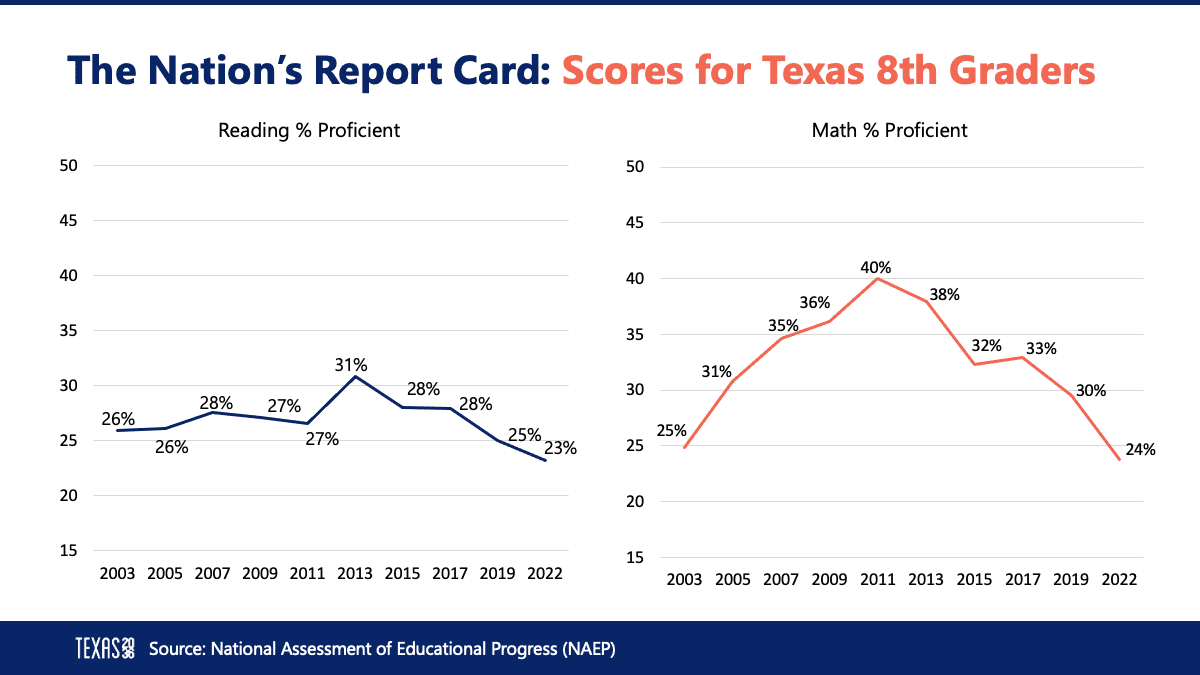This is a preview of our Texas 2036 newsletter about the Nation’s Report Card results. To receive this weekly highlight of our work, sign up here.
The Nation’s Report Card: Texas’ Scores 📚
Setting the Scene: On Monday, Oct. 24, the National Assessment of Educational Progress, better known as the Nation’s Report Card, released its results for 2022.
- The national exam is an assessment used to measure academic progress and provide information about student achievement with an emphasis on reading and math.
The Results: In Texas, 38% of 4th graders are proficient in math and 30% are proficient in reading. For Texas 8th graders, 24% are proficient in math and 23% are proficient in reading.
- For 8th graders, Texas received its lowest scores in math and reading in almost 20 years.
Zoom Out: While we saw a drop during the pandemic, scores for Texas students have been declining for at least a decade.

Moving Forward: The state needs to hold the line on a rigorous system of public school accountability and assessment to ensure a return on our $70 billion investment in public education.
- This includes recent bipartisan legislative achievements, such as a redesign of the STAAR test, the new A-F accountability system and the school finance overhaul of 2019.
Facts and Figures: While the Nation’s Report Card measures how students are performing over time compared with a national average, the STAAR exam is developed to test and compare within the state’s standards.
- The 2021–2022 STAAR results revealed Texas students made strong gains in reading but still struggle with math after the pandemic.
Why This Matters: Although the Nation’s Report Card and STAAR are different measurements, the contrast in scoring is enough to warrant more conversations about Texas’ academic standards and whether or not they are sufficient to meet the modern economy’s needs.
- There are currently movements both to cancel STAAR and water down the state’s accountability and assessment system, lowering standards for students and schools.
Texas 2036 Take: This week’s Nation’s Report Card data should give us strong caution and concern.
- Although they have risen over time, if Texas’ standards are already low and our student outcomes are declining, what will lowering expectations even further do to our state’s economic future?
Show Support: Texas voters want to prioritize funding for schools, increase teacher pay and know how their school is performing.
- In our recent Texas Voter Poll, Texans placed public education as their top spending priority for the state’s budget surplus.
- By wide margins, they supported teacher pay raises—both across the board and based on merit.
- And importantly, 87% of Texas voters support annual reading and math tests to provide “apples-to-apples comparisons” of how local schools are performing relative to others in the state.

For more on the Nation’s Report Card results and other education issues, follow Texas 2036 Senior Policy Advisor Mary Lynn Pruneda on Twitter.
Texas 2036 Statement: Texas’ Results 💬

“While the Nation’s Report Card shows Texas has improved its performance relative to other states, the majority of our students being below proficient in reading and mathematics is cause for serious concern and urgency.
We can and we must do better for our students.
In Texas, 38% of 4th graders are proficient in math and 30% are proficient in reading. For Texas 8th graders, 24% are proficient in math and 23% are proficient in reading.
While much of the initial media attention has focused on national declines in math performance during the pandemic, in Texas this is unfortunately not new. After steadily rising from the late 1990s, Texas peaked a decade ago.
Since 2011, the number of 8th graders proficient at math has declined from 40% to 24%. The six percentage point decline experienced during pandemic years is just a fraction of the overall decline over the past decade.
Bipartisan legislative achievements in recent sessions—including a redesign of the STAAR test, the new A-F accountability system and the school finance overhaul of 2019—use data to improve student and system performance. These reforms will take time to work, but Texas’ performance relative to other states during the pandemic provides a foundation on which to build.
The Legislature needs to stay the course on these reforms, investing in their data-proven strategies. These reforms of the past few sessions offer our best roadmap to continuing to improve student outcomes across our state and we cannot back off now.” –Margaret Spellings, Texas 2036 president and CEO

 What do you think about the Nation’s Report Card results?
What do you think about the Nation’s Report Card results?